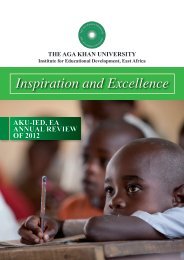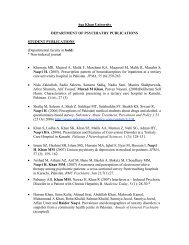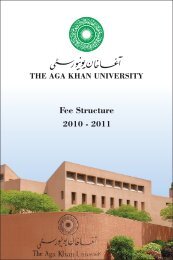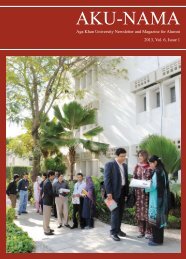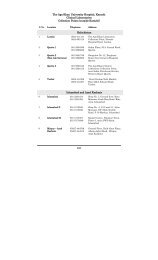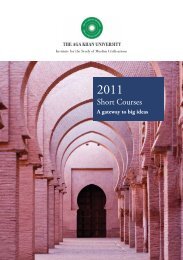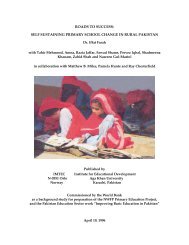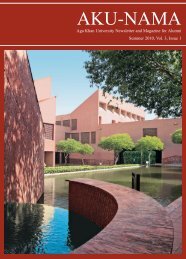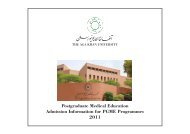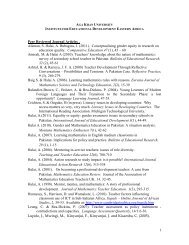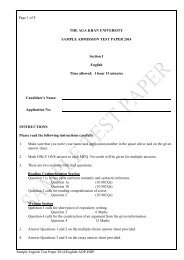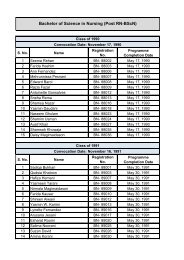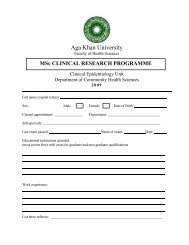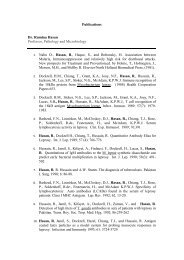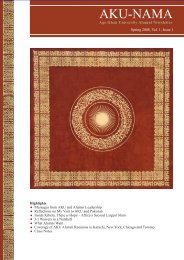Winter 2011, Vol. 4, Issue 2 - Aga Khan University
Winter 2011, Vol. 4, Issue 2 - Aga Khan University
Winter 2011, Vol. 4, Issue 2 - Aga Khan University
You also want an ePaper? Increase the reach of your titles
YUMPU automatically turns print PDFs into web optimized ePapers that Google loves.
Stepping Ahead<br />
Once you meet her, you know that<br />
Dr Zeenat Sulaiman, RN ’87, is a<br />
go-getter. Starting off as a registered<br />
nurse at the <strong>Aga</strong> <strong>Khan</strong> <strong>University</strong><br />
Hospital in Karachi, moving on<br />
to becoming a full-time faculty<br />
member at the School of Nursing<br />
in Pakistan, she is currently the<br />
Chief Nursing Officer (CNO), at the<br />
<strong>University</strong> Hospital in Nairobi.<br />
“As soon as I stepped out of<br />
SON, I knew that just having a<br />
diploma was not enough. I had to<br />
grow. At that time, my ambition was<br />
not to be CNO but to ensure that I<br />
would have an ongoing education.<br />
So from being a registered nurse I<br />
went on to do a BScN and then a<br />
master’s in nursing in the States.<br />
By then, I had started working in<br />
nursing administration and decided<br />
to do a master’s in health care. Inbetween<br />
I have been working and<br />
have just finished my doctorate from<br />
Johns Hopkins,” says Dr Sulaiman.<br />
Dr Zeenat Sulaiman, RN ’87<br />
But it has been studies with distinction:<br />
Listed on the Dean’s Honor<br />
List at the Medical <strong>University</strong> of<br />
South Carolina, Charleston in 1998;<br />
a recipient of the Administrative<br />
Residency Merit Scholarship from<br />
the Ralph H. Johnson Department<br />
of Veterans Affairs Medical Center,<br />
Charleston in 1993; and the only<br />
student to receive the <strong>Aga</strong> <strong>Khan</strong><br />
<strong>University</strong> scholarship in 1991.<br />
Sulaiman feels that with academics<br />
comes experience and with<br />
experience comes growth. This<br />
belief – and boldness – has empowered<br />
her to seize opportunities<br />
and make the most of them. Take<br />
her last professional decision. She<br />
was working as Associate Director,<br />
Nursing Services, leading the team<br />
of surgery, critical care and operating<br />
room nurses at AKUH, K when<br />
in 2001 the <strong>University</strong> Hospital in<br />
Nairobi approached her to lead their<br />
nursing team. Taking an intrepid<br />
leap forward, she took the decision<br />
to move to Nairobi.<br />
Upon her arrival in Nairobi, one<br />
of the first challenges was to reduce<br />
the nursing turnover rate. Over a<br />
quarter of the nurses were leaving<br />
the hospital every year, for a variety<br />
of reasons; by 2010, less than onetenth<br />
were turning over. It was Dr<br />
Sulaiman’s success in making decision<br />
makers understand the importance<br />
of nurses in the multidisciplinary<br />
working environment of health<br />
care systems which facilitated her<br />
in achieving this mark. “A nurse<br />
cannot work alone. It is important<br />
that we understand that we work in<br />
a system with other clinicians such<br />
as doctors, pharmacists, pathologists<br />
and other non-clinical support<br />
personnel and together we make a<br />
team that provides quality patient<br />
care. As a critical care nurse on the<br />
bedside, I realised that a leader is<br />
nothing without a team and I took<br />
Audiovisual Department AKU<br />
this learning from my bedside role<br />
to my leadership role and as a leader<br />
have always worked on developing<br />
an empowered, educated and motivated<br />
team,” says Dr Sulaiman.<br />
At the same time, she also<br />
continued working closely with the<br />
School of Nursing as an adjunct<br />
faculty member in Nairobi. “To be<br />
a good nursing leader I have to be<br />
embedded in clinical practice and I<br />
strongly believe that for one to be a<br />
good teacher it is just as important<br />
to be clinically competent. It is<br />
essential that I talk to my students<br />
in class about real life experiences.<br />
I can’t separate the two roles – one<br />
benefits the other. My heart is in<br />
clinical nursing, the learning from<br />
which I take to my classroom and<br />
the learning from my teaching I take<br />
to my administration and this goes<br />
back and forth.”<br />
Sulaiman feels that<br />
with academics comes<br />
experience and with<br />
experience comes<br />
growth. This belief<br />
– and boldness – has<br />
empowered her to seize<br />
opportunities and make<br />
the most of them.<br />
She has been equally supportive<br />
of young nurses, mentoring them to<br />
build rewarding careers. Her biggest<br />
challenge has been to prepare<br />
nurses at the undergraduate level<br />
coming to work at AKUH, N who<br />
have graduated from various local<br />
schools in Kenya. “I get nurses from<br />
all over the country who are warm,<br />
dedicated and who have the passion<br />
for the profession. However, they<br />
lack the skills, the art of negotiation,<br />
the leadership qualities or the will<br />
to take a stand for their own opinion<br />
or to advocate for their patient’s<br />
treatment. Since no undergraduate<br />
programmes exist in East Africa the<br />
basic clinical skills of these nurses<br />
Dr Zeenat Sulaiman, RN ’87<br />
need to be strengthened,” elaborates<br />
Dr Sulaiman. Therefore “a lot of my<br />
time and energy goes into bringing<br />
my nursing staff up to a certain level<br />
through a systematic thought-out<br />
education programme. All nurses<br />
have to take mandatory core competency<br />
education about service<br />
excellence. Leadership courses in<br />
which training in assertiveness is<br />
given are a must. The final outcome<br />
is to empower nurses to the level of<br />
becoming patient advocates. What<br />
is most fulfilling is that most nurses<br />
are not leaving the hospital and<br />
now there is a dependable team of<br />
nurse managers who can handle a<br />
lot on their own.” She also shared<br />
her enthusiasm about AKU starting<br />
its own undergraduate studies in<br />
nursing in 2015 in Nairobi.<br />
To date, Dr Sulaiman has been<br />
on the forefront of most AKU<br />
projects in East Africa. Actively involved<br />
with the planning, construction<br />
and staffing of the Heart and<br />
Cancer Centre (HCC) in Nairobi has<br />
been another landmark achievement<br />
of her career. “In 2004, I started as a<br />
client representative of the clinical<br />
team working with my doctors and<br />
nurses and the architects to plan the<br />
Audiovisual Department AKU<br />
facility.” She used her earlier experience<br />
of developing a multipurpose<br />
building, the Nazarali-Walji building<br />
in Karachi. With the HCC, she<br />
has been involved with three types<br />
of planning. The first is programme<br />
planning that envisions what exactly<br />
the clinical programme would look<br />
like in 20 years in the building.<br />
The second is the planning of the<br />
resources such as human resources/<br />
medical equipment and the third is<br />
space planning to ensure that the<br />
envisioned programme fits into the<br />
building being constructed.<br />
For Dr Sulaiman, HCC<br />
is definitely not the end but<br />
the beginning of a whole new<br />
opportunity to take health care<br />
forward. Patients do not have to<br />
go to India and South Africa but<br />
can receive quality, international<br />
standard care close to their homes.<br />
On another note, it is going to lead<br />
to a lot of educational programmes<br />
for local students. “We are<br />
planning oncology and cardiology<br />
fellowships. Therefore it is not just a<br />
building for patients but a promising<br />
avenue that is going to take care of<br />
our health education as well,” says a<br />
satisfied Dr Sulaiman.<br />
1 6 1 7



